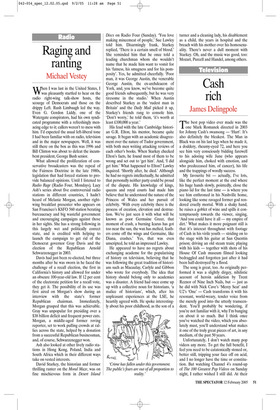Raging and ranting
Michael Vestey
When I was last in the United States, I was pleasantly startled to hear on the radio right-wing talk-show hosts, the scourge of Democrats and those on the drippy Left. Rush Limbaugh led the way. Even G. Gordon Liddy, one of the Watergate conspirators, had his own syndicated programme with a refreshingly menacing edge to it; callers weren’t to mess with him. I’d expected the usual left-liberal tone I had been familiar with on radio, television and in the major newspapers. Well, it was still there on the box as this was 1996 and Bill Clinton was about to defeat the incumbent president, George Bush senior.
What allowed the proliferation of conservative broadcasters was the repeal of the Fairness Doctrine in the late 1980s, legislation that had forced stations to provide balanced opinions. Until I listened to Radio Rage (Radio Four, Mondays), Lucy Ash’s series about five controversial radio stations in different countries, I hadn’t heard of Melanie Morgan, another rightwing breakfast presenter who appears on San Francisco’s KSFO 560 station berating bureaucracy and big wasteful government and encouraging campaigns against those in her sights. She has a strong following in this largely wet and politically correct state, and is credited with helping to launch the campaign to get rid of the Democrat governor Gray Davis and the election of the Republican Arnold Schwarzenegger in 2003.
Davis had just been re-elected, but three months after he was sworn in he faced the challenge of a recall election, the first in California’s history and allowed for under an obscure 100-year-old law. If 12 per cent of the electorate petition for a recall vote, they get it. The possibility of its use was first aired on Morgan’s show during an interview with the state’s former Republican chairman. Immediately, Morgan grasped that this was achievable. Gray was unpopular for presiding over a $38 billion deficit and frequent power cuts. Morgan, a middle-aged former roving reporter, set to work pulling crowds at rallies across the state, helped by a donation from a successful Republican businessman, and, of course, Schwarzenegger won.
Ash also looked at other lively radio stations in Hong Kong, Poland, India and South Africa which in their different ways take on vested interests.
David Starkey, the historian and former thrilling ranter on the Moral Maze, was on fine mischievous form in Desert Island Discs on Radio Four (Sunday). ‘You love making mincemeat of people,’ Sue Lawley told him. Disarmingly frank, Starkey replied, ‘There is a certain smell of blood.’ She reminded him that he once told a leading churchman whom she wouldn’t name that he made him want to vomit for his ‘fatness, his smugness and for his pomposity’. Yes, he admitted cheerfully. ‘Poor man, it was George Austin, the venerable George Austin, the ex-archdeacon of York, and, you know, we’ve become quite good friends subsequently, but he was very tiresome in the studio.’ When Austin described Starkey as the ‘rudest man in Britain’ and the Daily Mail picked it up, Starkey’s friends rang to console him. ‘Don’t worry,’ he told them, ‘it’s worth at least £100,000 a year.’ His feud with the late Cambridge historian G.R. Elton, his mentor, became quite savage. It began with an academic disagreement over the nature of Tudor government, with both men writing attacking reviews of each other’s books. When Starkey checked Elton’s facts, he found most of them to be wrong and set out to ‘get him’. And, ‘I did get him.’ What happened to Elton? Lawley inquired. ‘Shortly after, he died.’ Although he had no regrets intellectually, he admitted that personally neither party could be proud of the dispute. His knowledge of kings, queens and royal courts had made him believe that he understood the nature of the Princess of Wales and her pursuit of celebrity. ‘With every celebrity there is the process of creation, elevation and destruction. We’ve just seen it with what will be known as poor Germaine Greer, that moment of crash, a burning Icarus has got too near the sun, the wax has melted, feathers come off the wings and Germaine, like Diana, crashes.’ Yes, that was even unscripted, he told an impressed Lawley.
He appeared to have no regrets about exchanging academe for the popularising of history on television, believing that he was following the great tradition of historians such as Macaulay, Carlyle and Gibbon who wrote for everybody. The idea that history should belong only to academics was a disaster. A friend had once come up up with a collective noun for historians, ‘a malice of historians’, which, after his unpleasant experiences at the LSE, he heartily agreed with. He spoke interestingly about his poor childhood, as the son of a turner and a cleaning lady, his disablement as a child, the years in hospital and the breach with his mother over his homosexuality. There’s never a dull moment with Starkey. Oh, and the music was good, too: Mozart, Purcell and Handel, among others.













































 Previous page
Previous page